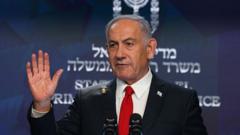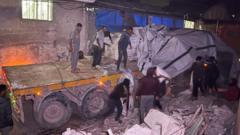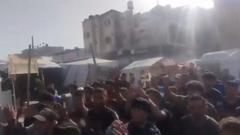In a significant move toward establishing state authority over armed factions, Lebanon is set to begin disarming Palestinian groups within its refugee camps in June. This initiative is viewed as a precursor to a more complex endeavor of disarming Hezbollah, the mighty Iran-backed militia which eclipses Lebanese military power.
Lebanon's Government Set to Disarm Palestinian Factions in Refugee Camps

Lebanon's Government Set to Disarm Palestinian Factions in Refugee Camps
Lebanon aims to tighten control over armed groups with a focus on Palestinian militias.
Lebanon’s government has officially announced its plan to commence disarming armed Palestinian factions residing within its refugee camps starting in June. This strategic measure aims at reinforcing state control over the proliferation of arms in the country, according to a statement from a government spokesperson on Friday.
Mohanad Hage Ali, a fellow at the Carnegie Middle East Center in Beirut, emphasized the significance of this initiative. “Disarming Palestinian factions is a test run,” he noted, suggesting that if executed effectively, it might accelerate a parallel effort to disarm Hezbollah, the influential militia that has maintained a strong grip on southern Lebanon for decades.
Historically, the Lebanese state and its military have struggled to exert authority over numerous armed groups operating outside the governmental framework, primarily due to Hezbollah's substantial military prowess, which often surpasses that of the official armed forces. Meanwhile, various Palestinian armed factions wield considerable influence in Lebanon’s densely populated and impoverished refugee camps, areas generally off-limits to the Lebanese army.
The recent conflicts with Israel have notably weakened Iran-aligned militias across the Middle East, including both Hezbollah and Hamas in Gaza. In light of these developments, Lebanon's new administration is taking bold steps to diminish Hezbollah's leverage and reclaim state authority over national security matters. This move could potentially redefine power dynamics within the nation and set a precedent for future governance and security policies in Lebanon.
Mohanad Hage Ali, a fellow at the Carnegie Middle East Center in Beirut, emphasized the significance of this initiative. “Disarming Palestinian factions is a test run,” he noted, suggesting that if executed effectively, it might accelerate a parallel effort to disarm Hezbollah, the influential militia that has maintained a strong grip on southern Lebanon for decades.
Historically, the Lebanese state and its military have struggled to exert authority over numerous armed groups operating outside the governmental framework, primarily due to Hezbollah's substantial military prowess, which often surpasses that of the official armed forces. Meanwhile, various Palestinian armed factions wield considerable influence in Lebanon’s densely populated and impoverished refugee camps, areas generally off-limits to the Lebanese army.
The recent conflicts with Israel have notably weakened Iran-aligned militias across the Middle East, including both Hezbollah and Hamas in Gaza. In light of these developments, Lebanon's new administration is taking bold steps to diminish Hezbollah's leverage and reclaim state authority over national security matters. This move could potentially redefine power dynamics within the nation and set a precedent for future governance and security policies in Lebanon.



















